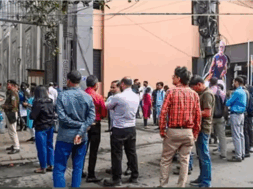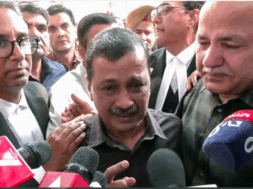
SC Agrees to Examine if CBI Can Investigate Cases in West Bengal without State’s Prior Consent
Manas Dasgupta
NEW DELHI, July 10: In a major relief to the Mamata Banerjee government, the Supreme Court on Wednesday rejected the Centre’s stand that it had no jurisdiction over the Central Bureau of Investigation (CBI) and agreed to examine the West Bengal government’s petition accusing the Union Government of ordering CBI investigations into cases without seeking the state’s prior consent.
Rejecting the preliminary objections of the Centre, a bench of Justices BR Gavai and KV Vishwanathan upheld the maintainability of the West Bengal government’s suit accusing the Centre of “constitutional overreach” and violation of federalism by unilaterally employing the CBI without the State’s prior consent. The bench held that the Mamata Banerjee government’s challenge to the Centre over the CBI investigating West Bengal cases without the state’s consent was valid and proceeded to fix August 13 for framing the legal issues involved in the suit.
The case could have repercussions in several other non-BJP ruled states which also have witnessed CBI investigations of cases within their jurisdictions without seeking the state government’s prior consent.
The bench refused to accept the Union’s preliminary objections to the suit, including that the Union did not control the CBI. Solicitor General Tushar Mehta, for the Union, had argued that the Centre was not the master of the CBI.
Mr Mehta had argued that the premier investigating agency operated completely independent of the Centre. The Union cannot be made liable for cases registered and investigated by the premier investigating agency within a State. West Bengal had wrongly made the Union defendant in the suit, he had urged.
The law officer had further contended that the CBI, too, cannot be made a defendant in the suit. The agency was not a ‘State’. Original suits filed directly in the Supreme Court under Article 131 of the Constitution exclusively deal with disputes involving the Union and the States, he had reasoned.
The law officer had pressed the court to dismiss the West Bengal suit as unmaintainable on these preliminary grounds without going into the merits of the issues raised.
However, the Bench said the suit raised “serious questions concerning the wider ramifications of federalism.” The Union’s preliminary contentions on maintainability did not pass muster, the court observed.
The West Bengal government represented by senior advocate Kapil Sibal had raised specific contentions that the CBI acted on the Centre’s directions. The State had said the CBI could not investigate within a State without a specific notification from the Centre extending its jurisdiction to any area within a State, including railway lands.
Prior consent of a State was mandatory. West Bengal had withdrawn its general consent to CBI investigations within its territory under Section 6 of the Delhi Special Police Establishment (DSPE) Act, 1946 way back on November 16, 2018, Mr Sibal pointed out. Nevertheless, the CBI, with the blessings of the Centre, had gone on to register 15 cases within West Bengal without taking the State’s consent. This had prompted the State to approach the Supreme Court in a suit, Mr Sibal explained.
“After withdrawal of consent by West Bengal on November 16, 2018, the CBI could not have continued to register cases and exercise powers under the DSPE Act,” the judgment reproduced the arguments of West Bengal in the suit on Wednesday.
During a previous hearing of the suit, the court had queried, “since law and order is a State subject, suppose a central employee commits dacoity, would the case be investigated by the CBI only?” Mr Sibal had submitted that “the intent is to get in through the CBI, then use the Directorate of Enforcement (ED) and then do whatever is to be done… This has far-reaching repercussions.”
The Wednesday’s order by the Supreme Court came as a twist after the court recently allowed a CBI probe into the multiple cases of sexual assault and land grabbing on the island of Sandeshkhali – despite opposition from Bengal. The Bengal government had approached the Supreme Court against the CBI over filing cases despite the state withdrawing its general consent to the central agency in 2018. The court had reserved the decision on May 8 after hearing both parties.
“We have considered the DSPE (Delhi Special Police Establishment) Act and Supreme Court rules. It cannot be said that West Bengal has not made out any case against Centre,” it said. According to section 6 of the DSPE Act, 1946, the CBI must obtain consent from respective state governments to conduct investigations in their jurisdiction.
The DSPE Act provides immunity from the Centre’s powers, the court added. “We find that in the present suit, the plaintiff is raising the legal issue of whether CBI can file a case under the DSPE Act after revocation of consent. Can CBI register and investigate cases in violation of Section 6?” the court asked.
The CBI is currently probing multiple charges of sexual assault, land grabbing, and ration scam against Shahjahan Sheikh – a former Trinamool leader and local strongman – and his aides in Bengal’s Sandeshkhali.
The Bengal government had opposed the Calcutta High Court’s CBI probe into the case. Allowing the CBI to continue its probe on Monday, the Supreme Court had wondered why the Bengal government was interested in protecting an individual.
Another Bench of the Supreme Court is tackling a similar question of law related to the State of Tamil Nadu in the case of Ankit Tiwari, an ED officer against whom the Tamil Nadu Directorate of Vigilance and Anti-Corruption had launched a criminal prosecution for bribery.














